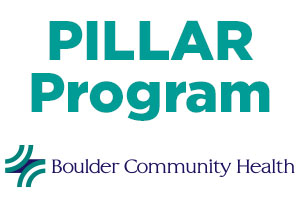BCH PILLAR Program: Support for Addiction Recovery
- Category: General, Mental Health, Pain Management
- Posted On:
- Written By: Boulder Community Health

In November 2020, the BCH Opioid & Chronic Pain Response Program adopted a new name. Now known as the Prevention & Intervention for Life-Long Alternatives and Recovery Program (PILLAR), the team offers support for addiction recovery by providing education, care coordination services and community events.
Amanda Wroblewski, a Licensed Clinical Social Worker (LCSW), has spent most of her career in HIV wrap-around care and substance abuse treatment. She has worked with individuals, couples, families and in pediatrics. As PILLAR’s Program Coordinator, Amanda is developing the program, working towards sustainability and serving the needs of our community.
Shelby Souther – who has a background in social work, criminal justice and case management – has experience working with individuals with opioid use disorders in Medication-Assisted Treatment (MAT), detoxification, jails and outreach settings. As PILLAR’s Patient Navigator, Shelby provides direct care to patients and coordinates treatment referrals for substance use disorders, chronic pain, alternatives to opioids (ALTO), and mental health.
PILLAR explores recovery and treatment paths and provides referrals to non-opioid options for those trying to manage chronic pain. PILLAR clients can be recovering from any issue, although there is a focus on substance addiction treatment and chronic pain management.
The PILLAR Program provides service navigation and short-term case management, as well as some limited scholarships, to those seeking treatment for substance use disorders or chronic pain. While service navigation and case management is open to anyone, PILLAR’s scholarships have exclusive, but low barrier, criteria for qualification.
PILLAR team members do not refer to, or have relationships with, medical pain providers; they concentrate on alternatives to pain management including ancient bodywork practices like reiki, yoga, acupuncture, the Feldenkrais Method and mindfulness. BCH’s Dr. Bradley Fanestil and BCH’s Center for Mind Body Medicine are trusted PILLAR partners.
Serving a diverse population is one of PILLAR’s main goals. The former Opioid & Chronic Pain Response Program name suggested a focus only on opioid misuse and addiction.
“The truth of the matter is that most people struggling with addiction are referred to as polysubstance users, meaning there can be a number of different substances of abuse at any given time,” says Wroblewski. “In addition to broadening our focus to all drugs of abuse, we received feedback that the word 'opioid' turned a lot of people off or gave the impression that we were a substance abuse treatment program.”
Services provided by the PILLAR Program are free of charge, and financial assistance can be provided to those who are uninsured, underinsured and undocumented. Scholarships may be able to help pay for medical copays, gaps in insurance coverage, office visits, alternatives to pain management, certain medications or specific transportation needs.
“We hope the PILLAR acronym lends itself to imagery of strength, support, stability and guidance,” says Wroblewski. “These are qualities we strive to provide to all of our participants, as well as those involved in their care.”
To learn more about PILLAR, click here. To learn more about the Center for Mind Body Medicine and Dr. Fanestil, click here.